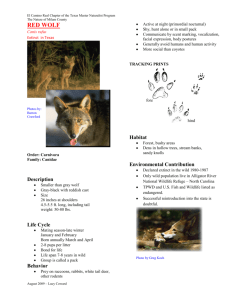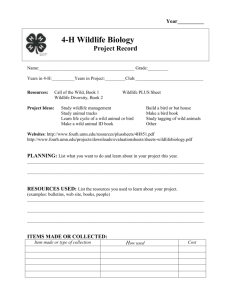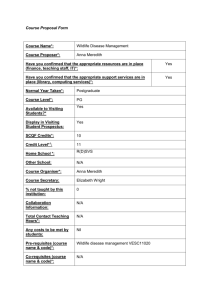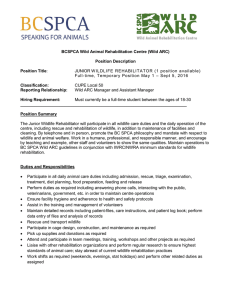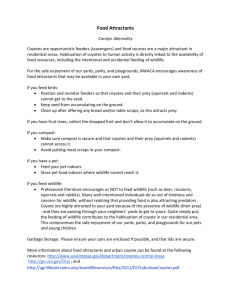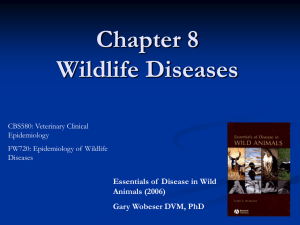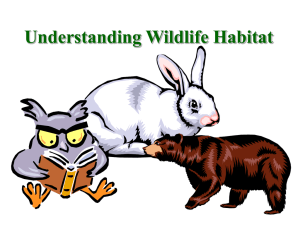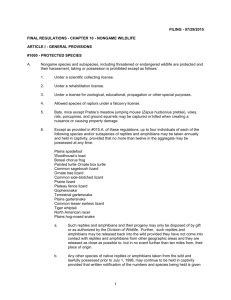General_DYK_IllegalToPossessWildlife
advertisement
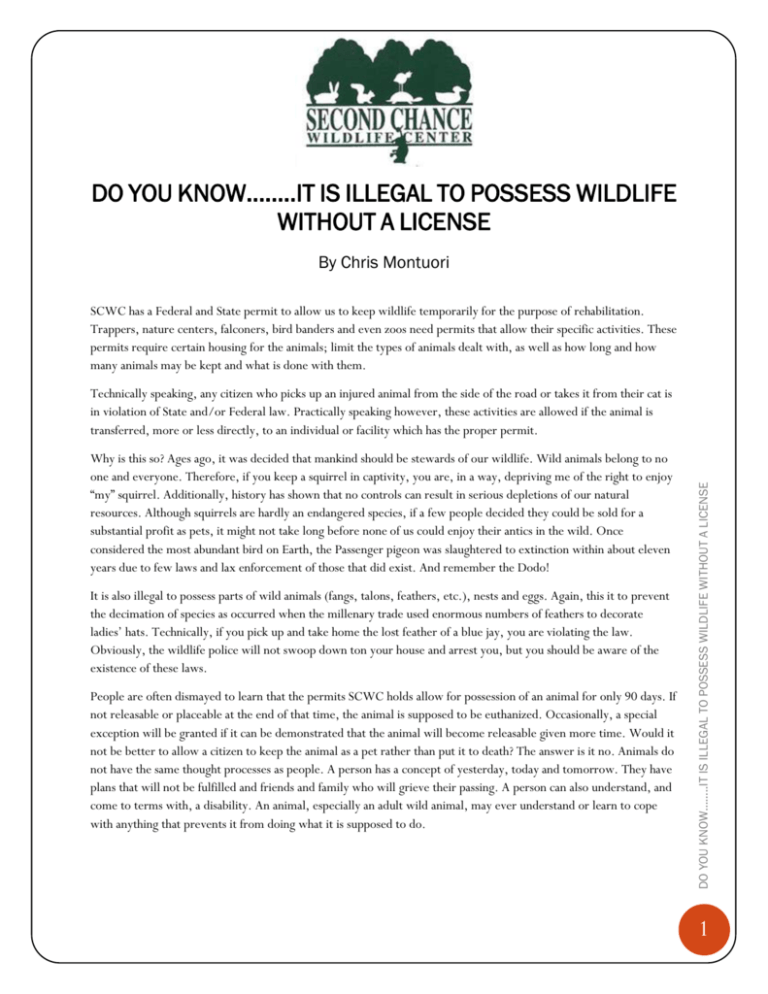
DO YOU KNOW……..IT IS ILLEGAL TO POSSESS WILDLIFE WITHOUT A LICENSE By Chris Montuori SCWC has a Federal and State permit to allow us to keep wildlife temporarily for the purpose of rehabilitation. Trappers, nature centers, falconers, bird banders and even zoos need permits that allow their specific activities. These permits require certain housing for the animals; limit the types of animals dealt with, as well as how long and how many animals may be kept and what is done with them. Why is this so? Ages ago, it was decided that mankind should be stewards of our wildlife. Wild animals belong to no one and everyone. Therefore, if you keep a squirrel in captivity, you are, in a way, depriving me of the right to enjoy “my” squirrel. Additionally, history has shown that no controls can result in serious depletions of our natural resources. Although squirrels are hardly an endangered species, if a few people decided they could be sold for a substantial profit as pets, it might not take long before none of us could enjoy their antics in the wild. Once considered the most abundant bird on Earth, the Passenger pigeon was slaughtered to extinction within about eleven years due to few laws and lax enforcement of those that did exist. And remember the Dodo! It is also illegal to possess parts of wild animals (fangs, talons, feathers, etc.), nests and eggs. Again, this it to prevent the decimation of species as occurred when the millenary trade used enormous numbers of feathers to decorate ladies’ hats. Technically, if you pick up and take home the lost feather of a blue jay, you are violating the law. Obviously, the wildlife police will not swoop down ton your house and arrest you, but you should be aware of the existence of these laws. People are often dismayed to learn that the permits SCWC holds allow for possession of an animal for only 90 days. If not releasable or placeable at the end of that time, the animal is supposed to be euthanized. Occasionally, a special exception will be granted if it can be demonstrated that the animal will become releasable given more time. Would it not be better to allow a citizen to keep the animal as a pet rather than put it to death? The answer is it no. Animals do not have the same thought processes as people. A person has a concept of yesterday, today and tomorrow. They have plans that will not be fulfilled and friends and family who will grieve their passing. A person can also understand, and come to terms with, a disability. An animal, especially an adult wild animal, may ever understand or learn to cope with anything that prevents it from doing what it is supposed to do. DO YOU KNOW……..IT IS ILLEGAL TO POSSESS WILDLIFE WITHOUT A LICENSE Technically speaking, any citizen who picks up an injured animal from the side of the road or takes it from their cat is in violation of State and/or Federal law. Practically speaking however, these activities are allowed if the animal is transferred, more or less directly, to an individual or facility which has the proper permit. 1 Nature is unforgiving. Any wild animal that cannot support itself is quickly dispatched and consumed by another species. That is the way of things. Wildlife kept in captivity are exposed to continuous stress from that captivity. The animal is unable to understand that we mean no harm and so it lives its life expecting to be devoured at any moment. How would you feel under those circumstances? In addition, some animals are very social and need the company of their own kind. They cannot stand why they have been isolated. Solitary confinement for human prisoners is considered extreme and inhumane. Finally, a wild animal cannot accept or understand the loss of certain skills, such as flying or climbing. It will continue trying to behave normally despite repeated failures. DO YOU KNOW……..IT IS ILLEGAL TO POSSESS WILDLIFE WITHOUT A LICENSE Frequently, animals will self-mutilate, biting and destroying useless wings or legs. Is keeping them alive really a favor? No matter how good your intentions, one must always consider what is best for the animal. We would like very much to be able to provide a permanent home for every creature that can survive. Over the years however, we have come to the conclusion that that is a selfish desire. Our permit requires that some disposition be made of each animal that is admitted to us within 90 days. In most cases, that is more than enough time to recover, if it is going to do so. I have always been pleased by the number of people who profess to love animals. True love means doing what is best for the loved one. Sometimes, what is best is very difficult. 2 P.S. October 2008: Both U.S. Fish and Wildlife and Maryland’s Department of Natural Resources (DNR) have extended the rehabilitation time to 180 days, as many animals must be over-wintered due to their special circumstances. Fall-season baby squirrels, reptiles and other hibernating mammals that miss the first frost deadline for release must be over-wintered as releasing them would prove a death sentence. Migratory birds, especially those that fly in great flocks, are also overwintered if they miss their deadline. These birds migrate to follow a food source no longer found in our area, such as certain fruits, insects or more abundant prey. They would not be able to survive our winters. With these extended deadlines, rehabbers are able to increase their success with species that are more numerous (squirrels) or with patients that require physical therapy time. ~ Brittany Davis, Staff Reprinted from "Second Thoughts" newsletter – Spring 1996. Copyright 1996 - Second Chance Wildlife Center, Inc.
